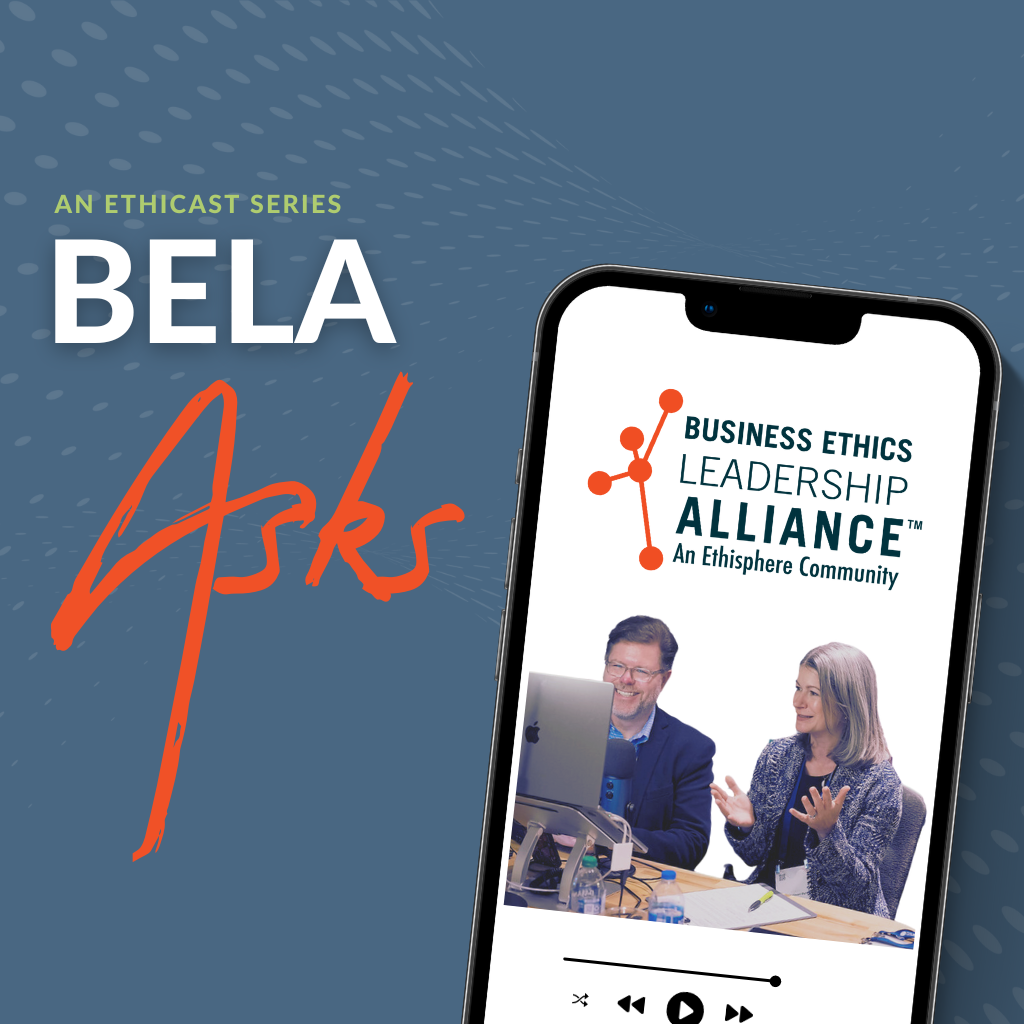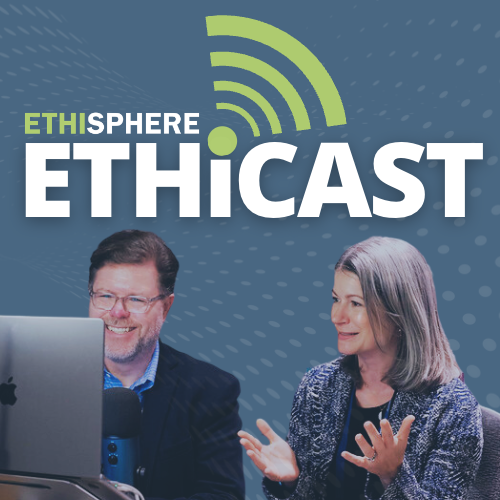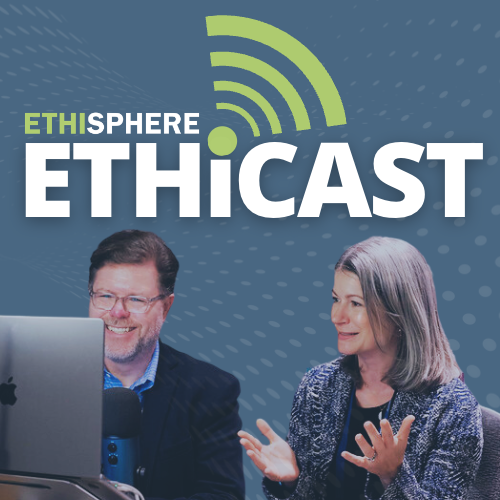Episode Transcript
[00:00:00] Speaker A: Hi, everyone. You've got questions and we've got answers. Welcome to another Bella Asks episode of the Ethicast.
The Business Ethics Leadership alliance, or bela, is a global ethics and compliance community that provides exclusive access to helpful data, benchmarking events and other resources to advance your ethics and compliance program.
One of those resources is bella's concierge service, in which members can submit any question regarding ethics and compliance, and our internal experts will provide an answer, plus helpful resources with more information.
Now, while we invite everyone watching and listening to join bella, we also know that there is no competition in compliance, so we're using this program to thematically respond to high level questions from the BELA community for the benefit of ENC teams everywhere.
And joining us once again to answer those questions is Bella chair Erica Salmon Byrne. Erica, it's terrific to see you.
[00:01:02] Speaker B: Once again, Bill, it is terrific to see you, I think. Are we approaching 70 ish? Bella asks. At this point, I feel like you and I had a chance to answer a lot of fun questions.
[00:01:14] Speaker A: Yeah. I think we're coming up on the diamond anniversary shortly, so yeah. Our next question is a communications question and it's one that's near and dear to my heart, certainly, and it reads, how do I start an ethics podcast?
[00:01:28] Speaker B: So I'm not going to even try, Bill, to cover the tips and tricks that I know you have as a podcasting expert, but I will spend just a moment or two talking a little bit about why I think the, this particular question came in the way that it did.
And I think it came in from a Bella member who's been thinking a lot about the third M in the communications triangle, which is modality. So, so how do I reach my employees? How do I get my, my content in front of people in the right way at the right time? And without question, the podcasting approach is a great way. You, it's, it's an, it's an opportunity to show your personality, to showcase the work of the program, to grab, literally grab ears in a moment in time where, you know, maybe somebody's walking between meetings and they're listening. Maybe they've got it playing on their computer and they're listening. Maybe they're watching. Maybe there's so many different aspects of this medium that really lend itself extraordinarily well to effective employee communications. And at the end of the day, what you, as a compliance professional are trying to do is you're trying to engage your employee base, you're trying to engage your stakeholders in the work that you're doing, because they are the work, right?
You need to be able to grab their mind, share, grab their attention, and have them think of you at that moment in time. So using this kind of hybrid audio, visual format to do so makes a tremendous amount of sense. But as I said, I'm not the podcasting expert. I'm talking to the podcasting experts. So, Bill, what are your thoughts on this topic?
[00:03:00] Speaker A: Podcasting is a asymmetric way to get your message across to an audience. And by that, I mean the amount of cost and energy that goes into making a podcast is actually much smaller than the impact you can have coming out of it. So it's a really great use of your resources, because it's actually not that difficult to create a podcast, and it's not that resource intensive to. To produce one. And I know of, you know, some SECOs out there who, they run very successful podcasts that run internally. You wouldn't necessarily see them on the Apple or Spotify channels, but they're internal shows that do an awful lot to drive engagement for the E and C program and really help them move the needle in a meaningful way. So we start by, you know, talking to your fellow Bell members and see who's got a podcast running in their company and how it's working. But for general podcasting practice, what I'll offer is this one, is there's the who, what, where, when, why, how aspect of it, which is, what do you want your podcast to say? How do you want to say it? Like, what kind of tone do you want to use?
Who will say it? Who's going to run the show? Do you want to have an interview? Do you want to have guests? How do you want to actually do that? And who's going to be responsible for doing all that? When will you say, what will your cadence be? How frequently will you be producing episodes? And that's a really important one, because people often, they bite off more than they can chew, and they realize that keeping up the cadence is tougher than it looks at the outset. And then ask yourself, why will you say what you're saying? You know, what is the point of this program and what effect is it meaning to have on your. On your audience as you get to all that? What I would recommend is do a strong peer review of, like, what other ethics podcasts are out there that you'd like to listen to? If you're hearing me talk now, thank you very much for joining us. You sure like to see that. But there are plenty of other great programs out there, and I would Encourage you to do a broad survey, spend a month, just go around, see what podcasts you can find and just ask yourself, like, why do I like this? Why does this work for me? How could I pick up from this and incorporate that in my own program as well? And that goes for this program too. I mean, formats are, you know, formats you can, you can pull for them as much as you like from there. Once you've decided to actually go ahead and do it to get into gear. I'm not going to get too deep into that, but I just want to point out that this show is produced on a bog standard company laptop with some very, very cheap usb, LED lights, simple lavalier microphones. Not a huge amount of crazy studio tech is involved. It's very easy to produce. A podcast looks quite nice. You might want to invest in a green screen. That's always a nice thing to have. You want to have branded backgrounds for you and look into what kind of platforms you're going to want to use. We produce this on a platform called Streamyard, which we do not receive money for endorsing them. But I will say our usage of it has been very, very excellent and we really enjoy it. You will want to probably get a podcast hosting service like Kastos. There are others like it, but they will make sure that if your podcast is on like a company server and it gets hammered by 300 people listening to it at once, the episode will not stream properly. So having an external service that handles that for you, it's a very small cost each month, but it makes a lot, a big difference, making sure your program is reliable when you publish it. And then the other thing I would just point out is it's really important to create some kind of editorial schedule and then to stick to it. Probably the number one thing that kills podcasts is not the quality of the show and it's not a cruel audience. It's what they call pod fade.
Initial. You know, it's the initial enthusiasm to get a podcast up and running. And after about five or six episodes, the fatigue wears in, the novelty's worn off. It becomes an actual piece of work you have to do. And that's where a lot of podcasts run into a brick wall and simply vanish. Get a schedule that you know you can live to whatever that schedule is, and then just live by that. Your audience will adjust to your cadence.
Don't, you know, walk before you can run? If you think we could do a weekly podcast, try doing a bi weekly first and see how that feels. And Then if you really find it's just these episodes are just falling into your lap, then maybe move to weekly. But don't, don't, don't start off too much because you can, you can increase your cadence with your audience a lot more easily than you can decrease your cadence with your audience. Because once you start decreasing, usually that's entropy. And the show dies a very sad and lonely death that way. So.
[00:07:04] Speaker B: The thing I would add on that cadence piece in particular, Bill, is, is think about.
And here I'm particularly thinking about an internal, you know, sort of employee focused podcast where you're trying to communicate about ethics and compliance topics internally.
And I would think about where are people going to find it internally, right? So like, where, how are you going to make people aware of it and where is it going to live internally and how does it fit into the rest of the communication schedule? So are you, you know, I definitely don't recommend creating something that lives kind of out on its own and isn't pulled into your training plan, your comms plan, your corporate communication department's comms plan, you know, whatever work you might be doing with your ambassadors around the globe, right, Those you want to, you want to pull all those pieces in so that the podcast becomes, from a brand perspective, part of your broad ENC stance inside the organization. It has the same tone, it has the same branding. It feels cohesive as opposed to a passion project that, that you engaged in.
[00:08:08] Speaker A: If you think about the podcast you listen to, either professionally or personally, I will bet that more than a few of your very most favorite shows are conversation based. There are people talking to each other as opposed to one person simply dictating to. Solo podcasts work best at when they harness the power of conversation, not just between two guests on a show, but when the podcast is having a conversation with its audience as well. And for an ethics podcast to what you just said, Erica, it's part of a larger and more cohesive compliance communications program.
That podcast is not just an opportunity for you to express to your audience what you want them to know and to take to heart. It's also an opportunity for that to dovetail with other parts of your communications plan so you can get feedback from your audience on how is this podcast helping them? Can they be part of your podcast and using it to foster a much broader and more robust conversation about ethics and compliance and business integrity across your entire enterprise.
Co at it like that and you might be really pleasantly surprised at just how impactful your, your show can be. Yeah, 100% well, I think that's about the time for this episode. And Erica, thank you very much for letting me talk and fill the space for one time. You're a very, very gracious partner. This. Thank you so much.
[00:09:22] Speaker B: Oh, no, Bill, this is, you know, I mean, I, I can talk about the whys, but you're the, you're the, you're the man to talk about the house. So hopefully, hopefully we gave everybody some good things to think about on that one. And, and, you know, it's, as I said, it's.
This is, this is a great way to engage in an asynchronous dialogue with an audience that you care a lot about. And so maybe that's your internal audience at your company, or maybe as it is for Bill and I, it's the broader audience of the Bella community and ENC in general, which is a group that we care a lot about. So keep those questions coming so I get a chance to come back and talk to my friend Bill again.
[00:09:59] Speaker A: To learn more about Bella, visit ethisphere.com bella to request guest access to the member resource hub and to speak with the Bella Engagement director. If you have a question that you would like answered on this program, contact the Bella Concierge Service and we'll get to work on it for you. This has been another Bella Asks episode of the Ethicast. Thanks for joining us. We hope you've enjoyed the show. If you haven't already, please like and subscribe on YouTube, Apple Podcasts, and Spotify. And be sure to tell a colleague about us as well. It really helps the program. That's all for now, but until next time, remember, strong ethics is good business.


